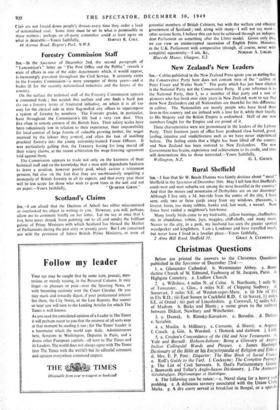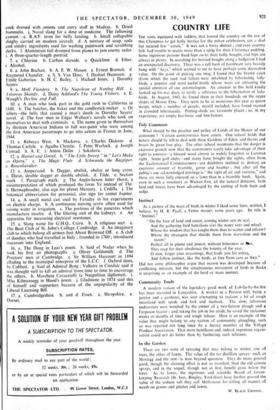Christmas Questions
Below are printed the answers to the Christmas Questions published in the Spectator of December 23rd:— 1. a. Gloucester Cathedral. b. Westminster Abbey. C. Bene- dictine Church of St. Edmund, Faubourg of. St. Jacques, Paris. d. Highgate Cemetery. e.. Ludlow Church.
2. a. Wiltshire, 4 miles N. of Caine. b. Northants, 1 mile W. of Towcester. c. Glos., 4 miles N.E. of Chipping Sodbury. d. Somerset, 3 miles S.E. of Weston-super-Mare. e. (i) Isle of Ely in Ely R.D.; (ii) East Sussex in Cuckfield R.D. f. (i) Surrey, 11 miles S.E. of Oxted ' • (ii) part of Lincolnshire. g. Cornwall, 11 miles S.E. of Madron. h. Berks and Hants ; a name given to the railway between Didcot, Newbury and Winchester.
3. a. Dvorak. b. Rimsky-Korsakov. c. Borodin. d. Delius.
e. Scriabin.
4. a. Muslin. b. Millinery. c. Currants. d. Sherry. e. Argosy. f. Coach. g. Gin. h. Worsted. i. Damask and damson. j. Lisle.
5. a. Cruden's Concordance of the Old and New Testaments. b. Yule and Burnell : Hobson-Jobson: Being a Glossary of Anglo- Indian Colloquial Words and Phrases. c. James Hastings' Dictionary of the Bible or his Encyclopaedia of Religion and Ethics. s.
d. Mrs. E. P. Post : Etiquette: The Blue Book of Social Usage. e. Ruff's Guide to the Turf. f. Cockayne: The Complete Peerage. g. The List of Civil Servants. h. Dod's Parliamentary Guide. i. Bosworth and Toiler's Anglo-Saxon Dictionary. j. The Annuaire Ginealogique, Diplomatique et Statistiquc.
6. The following can be eaten :—c. Naval slang for a heavy suet pudding. e. A delicious savoury associated with the Union Club, Malta. g. A dry curry served at breakfast in Bengal, or a spatch-.
cock dressed with .onions and curry stuff in • Madras. h. Dried hummelo. j. Naval slang for a dose of medicine. The following cannot.—a. R.A.F. term for belly landing. b. Small collapsible dinghy carried on modern aircraft. d. A mixture of soap, soda and sundry ingredients used for washing paintwork and scrubbing decks. f. Aluminium foil dropped from planes to jam enemy radar. I. A three-quarter-length portrait.
7. a. Chlorine b. Carbon dioxide. c. Quicklime. d. Ether. e Alcohol.
8. a. John Buchan. b. A. E. W. Mason. c. Ernest Bramah. d. Raymond Chandler. e. S. S. Van Dine. f. Dashiel Hammett. g Emile Gaboriau h. H. C. Bailey. i. Michael Inns. j. Dorothy Sayers
9. a. Moll Flanders. b. The Napoleon of Notting Hill. c. Tristram Shandy. d. 'Daisy Ashford's The Young Visiters. e. E. Waugh's Decline and Fall.
10. a. A man who took part in the gold rush to California in 1849. b. The butcher, the baker and the candlestick-maker c. Or tellers—the bells that caused a man's death in Dorothy Sayers novel. d. The four men in Edgar Wallace's novels who took on themselves to deal with criminals. e. The name given to themselves by thirteen American Indians in full war-paint who were among the first American paratroops to go into action in France in June, 1944.
11. a. Rebecca West. b. Markova. c. Charles Dickens. d. Thomas Carlyle. e. Agatha Christie. f. Peter Warlock. g. Joseph Conrad. h. A. E. i: Anton Dolin j. Sokolova.
12. a. Hansel and Crete!. b." The Little Sweep's in "Let's Make qn Opera." c. The Magic Flute d. Schwanda the Bagpiper. e. Rosenkavalier.
13. a. Ampersand. b. Dagger, obelisk, obelus or long cross.
Diesis, double dagger or double obelisk. d. Tilde. e. Section mark f. Paragraph mark. g. The Anglo-Saxon letter thorn, a misinterpretation of which produced the form Ye instead of The. h. Hermaphrodite. also sign for planet Mercury. i. Cedilla. j. The botanical abbreviation for perennial, also sign for comet Jupiter.
14. a. A small metal can used by Faraday in his experiments on electric charge. b. A continuous moving screw often used for raising water in irrigation. c. The portions of the pancreas which manufacture insulin. d. The filtering unit of the kidneys. e. An apparatus for measuring electrical resistance.
15. a. Slang name for G.H.Q., Cairo. b. A religious sect. c. I he Boat Club of St. John's College, Cambridge. d. An imaginary dub to which belong all airmen Just About Browned Off. e. A club of dandies who had travelled in Italy ; founded in 1760 ; introduced macaroni into England.
16. a. The Dong in .Lear's poem. b. Said of Nadar when he took his first air photographs. c. Oliver Goldsmith. d. The Proctors' men at Cambridge. e. Sir William Harcourt in 1894 illuding to the municipal enterprise of the L.C.C. f. Oxford dons, by Cobbett. g. Said of Admiral Byng ; Voltaire in Candide said it was thought well to kill an admiral from time to time to encourage the others. h. Marchese Cavacciolli (a Neapolitan diplomat). i. Miss Kilmansegg in Hood's poem. j. Gladstone in 1874 said this of himself and supporters because of the unpopularity of the I.iberal Licensing Bill.
17. a. Cambridgeshire. b. and d. Essex. c. Shropshire. e. Dorset.































 Previous page
Previous page